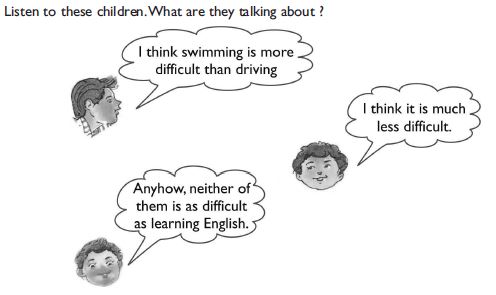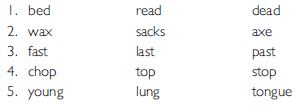Question 1:
Why did Taro run in the direction of the stream?
Answer:
Taro ran in the direction of the stream to quench his thirst.
Question 2:
How did Taro’s father show his happiness after drinking sake?
Answer:
Taro’s father showed his happiness by doing a little dance in the middle of the floor.
Question 3:
Why did the waterfall give Taro sake and others water?
Answer:
Taro was a thoughtful son. He wanted to serve his parents. But others were greedy. So the waterfall gave Taro sake and others water.
Question 4:
Why did the villagers want to drown Taro?
Answer:
The villagers wanted to drown Taro because they thought that he had tricked them.
Question 5:
Why did the Emperor reward Taro?
Answer:
The Emperor rewarded Taro for his goodness and kindness. By rewarding Taro he wanted to encourage all children to respect and obey their parents.
Question 6:
Mark the right item.
Taro earned very little money because
Answer:
the price of wood was very low.
Question 7:
Mark the right item.
Taro decided to earn extra money
Answer:
to buy his old father some sake.
Question 8:
Mark the right item.
The neighbour left Taro’s hut in a hurry because
Answer:
she wanted to tell the whole village about the waterfall.
Question 9:

Answer:

Question 10:
“This made Taro sadder than ever.”
“This’ refers to .....
(Mark the right item.)
Answer:
Taro’s inability to buy expensive sake for his father.
Question 11:
“This,” said the Emperor, “was to encourage all children to honour and obey their
parents.”
“This’ refers to ......
(Mark the right item.)
Answer:
rewarding Taro with gold and giving the fountain his name.
Question 12:

Answer:
young-lung; sad-bad; money-sunny; chop-stop; last-fast; wax-axe; could-wood; sound-round; way-day.
Question 13:

Answer:
young
Question 14:
Use the clues given below to complete this crossword puzzle.

Answer:
lonely
Question 15:

Answer:
thoughtful
Question 16:

Answer:
hard
Question 17:

Answer:
little
Question 18:

Answer:
beautiful
Question 19:

Answer:
delicious
Question 20:
Find these sentences in the story and fill in the blanks.
This made Taro ................
than ever.
Answer:
sadder
Question 21:
Find these sentences in the story and fill in the blanks.
He decided to work
................ than before.
Answer:
harder
Question 22:
Find these sentences in the story and fill in the blanks.
Next morning, Taro jumped out
of bed ................ than usual.
Answer:
earlier
Question 23:
Find these sentences in the story and fill in the blanks.
He began to chop even
................ .
Answer:
faster
Question 24:
Find these sentences in the story and fill in the blanks.
Next morning, Taro started for
work even ................ than the morning before.
Answer:
earlier
Question 25:
The story ‘Taro’s Reward’ shows that Taro is thoughtful, hardworking and also wise. Read aloud the parts of story that show these qualities in Taro.
Answer:
Taro is a thoughtful, hardworking and wise person. These qualities of his can be seen in the
lines of the following paragraphs.
Paragraph 1
"Though he worked hard but he earned very little money."
"for he was a thoughtful son and wanted to give his old parents everything they needed."
Paragraph 3
"He decided to work harder than before."
"How do I earn more money?" "How do I get a little sake for my poor old father?"
Paragraph 4
"My poor old father! He thought. "If only he was as warm as I!"
Paragraph 11
"But Taro has been wise enough to slip behind a rock when he saw how things were going."
Question 26:
i) Like Patrick in the story ‘Who did Patrick’s Homework’, Taro is helped by magic. Do you
believe in magic? What are the magical things that happen in these stories?
ii) Which story do you like better, and why? Do you know such stories in other languages?
Discuss these questions in class.
Answer:
i) Although I have seen magic, I'm not sure if it is true. In the present day and world it is
easier to perform tricks and fool people. So it is difficult for me to believe in it.
In the story "Who did Patrick's Homework?" one of the characters was an elf. He was too
small. We never see such small people around us. In the story "Taro's Reward" we read about
the magical stream behind the rocks. Since Taro's father wished to have sake and Taro was an
honest and thoughtful son the water tasted like sake to them but to all others it continued
to taste like water. This too is never heard in the real world.
ii) Both the stories have a moral. We learn the importance of hard work from both these
stories. The boost Patrick gets in his grades after he works hard to complete his homework
earns him the admiration of all. This changes his attitude towards work. Taro's story
teaches how his hard work and thoughtfulness towards his parents makes him an inspiration
for other children. I like both the stories equally. There are many other fables similar to
these stories. Most of these stories teach us a valuable lesson.
Question 27:
Now write a paragraph or two about these two stories, comparing them.
Answer:
We see many differences in these two stories.
Patrick's story belongs to the present world whereas Taro's story describes ancient days of
Japan. Patrick like other children always finds homework boring and dull. The story shows
that he was not as hard working in the beginning as he was by the end. Whereas Taro was
hardworking and caring right from the beginning.
In the first story, Patrick learns the importance of hard work after he himself finishes his
homework. There is no magic in this story. The elf simply tricks Patrick by making him feel
that he had been doing the homework for him. In Taro's story we read about a magical stream
that has water that tastes like sake. This on the other hand seems like magic.
Question 28:

Answer:
In the three dialogue boxes the children are discussing about things that they find difficult
to learn.
The first child finds swimming more difficult than driving. The second child
on the contrary thinks that swimming is easier than driving. The third child feels that
English is more difficult than swimming and driving.
Question 29:

Answer:
Most interesting : playing football, painting, dancing, reading.
The dullest : knitting, sewing, stamp collecting.
Most dangerous : swimming, mountain climbing.
Safest : walking.
Most rewarding : cooking, fishing, learning languages.
Most exciting : watching T.V., listening to music.
Question 30:

Answer:

